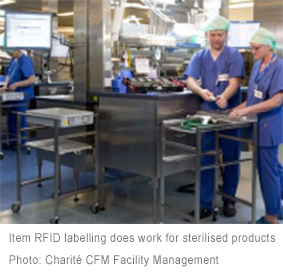Charité Hospital Berlin manages surgical instruments with Xerafy medical tags
For Charité Hospital in Berlin, Germany, the time and cost of managing 300,000 surgical instruments has been a work that the hospital needs to improve. The hospital has adopted coding and laser marking methods, but the instruments will still be mixed together because the code engraved on the device is not easy to read, and it is not convenient to record the information of the device's full life cycle. In February of this year, Charité Hospital finally found a solution that suits them: the use of RFID-based surgical instrument tracking, which uses medical -grade RFID tags and installations provided by Xerafy, as well as the well-known fine surgical instrument management solution in Germany. The software system provided by the solution provider ASANUS. The RFID im Blick Global website recently interviewed the person in charge of the surgical device disinfection management department on the project: the hospital released two different pilot projects, each with a different software system. The label is glued to the instrument with a special epoxy and is automatically tracked at all points in the device management process. The hospital performed a series of disinfection tests on the equipment installed on the label, including chemical cleaning, stress testing during transportation, and high temperature sterilization. These tests ensure the durability and readability of the label on the instrument, and the results show that Xerafy's medical grade label and label mounting solutions can withstand at least 500 hospital sterilization cycles. The glue used to install the label is critical throughout the pilot program. Oasmancevic, head of the hospital's device management department, said in an interview: "Our first concern is whether the glue is biocompatible, and any glue that does not meet medical requirements will not be used." This epoxy must be securely labeled. The ground is fixed on the instrument and cannot fall off. “We tested all the disinfection processes and found no problems. In actual operation, the device will be exposed to chemicals such as blood, saline and iodine. We hope that these conditions will not affect the label. The adhesion, we will pay close attention to this." Osmancevic also mentioned that the use of glue to install the label confirmed that the use of the device itself has no effect, because the label does not change the physical structure of the device, the hospital also works closely with the device manufacturer to solve the problem of more tag installation. In general, the label does not affect the device itself, and doctors and nurses also do not feel that the label will affect their use of the device. The hospital said that the two suppliers' solutions were good, but the hospital finally chose ASANUS because they are already using the disinfection equipment management software provided by ASANUS, and the newly added RFID modules do not need to add new systems. “RFID helps us achieve higher quality process management in the disinfection process. In 2017, the new device management department of the hospital will be managed by RFID.†Osmancevic has great information on the solution. Leafy Vegetables Container Plant Factory Leafy Vegetables Container Plant Factory,Automatic Control Container Farm,Intelligent Container Plant Factory,Hydroponic Vegetables Container Greenhouse Qingzhou JuLong Agriculture Equipment Co.,Ltd , https://www.julonggrowtech.com